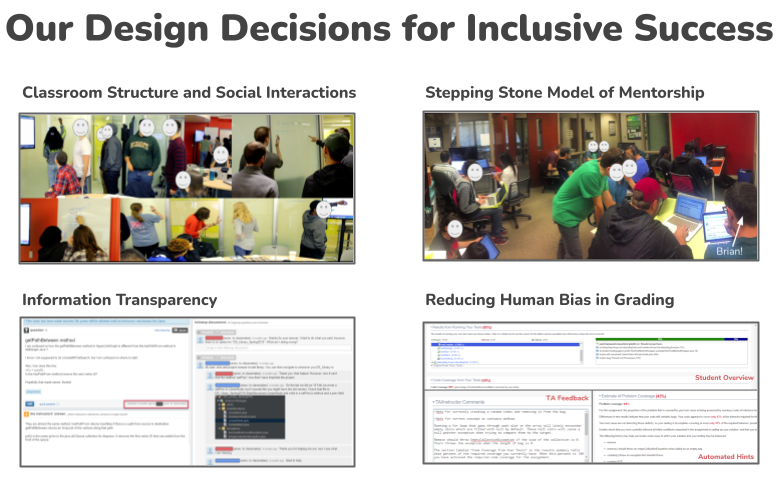Motivation
Education is something that should be facilitated by instructors not enforced by instructors.
Philosophy
Although active learning and constructivist learning philosophies are gaining in popularity, they were once much more popular than current mainstream didactic lecture-based teaching. Experiential learning, communities of practice, and peer learning are relics from a time when apprenticeships were the standard form of education. People learned by doing under the supervision of a master craftsman. Furthermore, learning was scaffolded - the apprentice would do the easy menial tasks until they proved their competence and moved on to more complicated tasks.
After the industrial revolution, this shifted and education was something that was enforced and regulated.Students sat quietly and consumed information delivered by an instructor with an intimate knowledge of the material. This approach scaled effectively for ten to thirty students which is one of the reasons that it was so popular. This model was extremely scalable for the time, but at the cost of critical thinking and the development of meta-cognitive skills.
In a modern educational landscape consisting of millions of students globally distributed this model is less scalable. These students are preparing for careers that will change multiple times over the course of a few decades. As a result, it is now more important than ever to teach students to be their own teachers and to allow them to teach each other. Teachers should now fulfill a new role as facilitators. By guiding students and scaffolding educational experiences it is possible to create scalable learning for this new massive and diverse group of learners.

My advisor and I have created a set of design decisions to improve inclusion and collaboration in the classroom. A paper about this concept was published at FIE 2018.
Recommendations Available
Dr. Manuel Pérez-Quiñones
Dr. Celine Latulipe
Dr. Jamie Payton
Dr. Ras Zbigniew
Various Student Letters
Course Instructor
CIS 5590: Human-AI Interaction new course development
Taught both as a design studio and a discussion course; students grapple with important questions about human-centered AI such as how to design for uncertainty, failure, ethics, and interpretability. Students also explore design methods in this less deterministic design setting.
Fall 2022, Temple University
CIS 3755: Introduction to Information Visualization new course development
A course that focuses on giving students the necessary skills to ask and answer questions with data. Course projects focus on visualizing rural and urban data in and around Philadelphia. Taught as a design studio and featuring active learning and flipped classroom.
Spring 2021, Temple University
CIS 4282/9182: Undergraduate Research
This is an opportunity for students to work on their own research under my guidance. Students meet with me weekly to get feedback on their research and plan their next steps. Topics areas broadly include human-computer interaction, natural language processing, social computing, creativity, and learning sciences.
Every semester, Temple University
Previous Courses
ITCS 6177 System Integration redesigned course
Team-teaching with another PhD student. Our course taught students to integrate databases, sensors, machine learning, physical devices, web apps, or visualizations as needed to solve real problems. Taught as a design studio, students also held workshops to account for the customizability/open-endedness of the course topics.
Spring 2018, UNC at Charlotte.
ITCS 1610/3610 STARS Leadership Course redesigned course
Service learning class taught as a startup incubtor. Each team developed a product to address a problem of societal relevance. Students were from Psychology, CS, and Management. Material included topics from psychology, marketing, management theory, history, and design.
Spring 2016, UNC at Charlotte.
Teaching Assistant
ITCS 3130 Human Computer Interaction
Summer II 2018, UNC at Charlotte.
ITIS 2214 Data-structures and Algorithms
Fall 2016, Spring 2017, UNC at Charlotte.
ITIS 1213 Intro to Media Programming II
Spring 2013, Spring 2015, UNC at Charlotte.
ITCS 3182 Computer Organization and Architecture
Fall 2012, UNC at Charlotte.
Non-academic Teaching
SDDW (San Diego Design Week)
2021, San Diego, California
D4SD (Design for San Diego)
2019-2021, San Diego, California
Trilogy Web Dev Bootcamp (Substitute Instructor)
Fall 2016-2017, Trilogy Bootcamp (UNCC Campus)